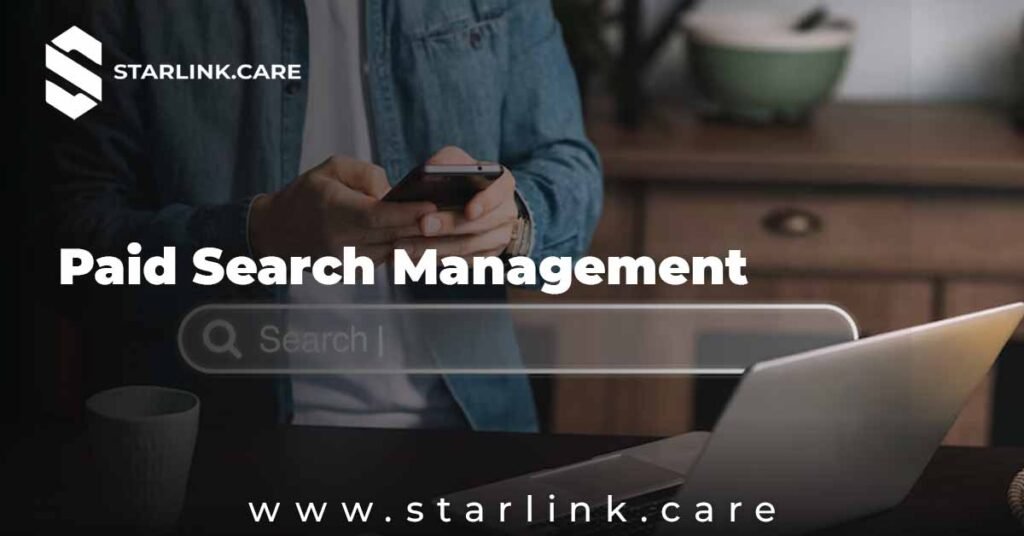Introduction
Imagine investing hundreds of pounds on internet advertising only to find either little or no return. Imagine now someone stepping in, improving your commercials, focussing on the correct audience, and then your phone starts ringing, orders arrive, and your business at last gets the attention it deserves. That is the potential of proper sponsored search management.
Businesses in the fast-paced digital era of today demand visibility, planning, and speed rather than only an online presence. Paid search management is among the most powerful tools available if you’re committed to rapidly expanding your company.
Describes Paid Search Management.
Fundamentally, paid search administration is the operating and optimising process for sponsored advertising campaigns on Google and Bing. If your ad is well-managed, it shows at the top of the results when users search for terms connected to your good or service.
Paid search, sometimes referred to PPC (pay-per-click), lets you bid on keywords pertinent to your company. A competent paid search management system guides you in choosing the ideal keywords, crafting engaging ad copy, controlling bidding policies, and always improving outcomes. It’s not only about generating clicks; it’s about obtaining the correct clicks that result in business.
Why It Matters for Economic Development
Many companies run their own ads and give up after investing money with little to show for it. Paid search is really somewhat complex. Without competent management, you may easily squander your money on useless audiences or inferior clicks.
Consider Jack, a man running an online bicycle store. Targeting broad phrases like “bikes,” “cycle,” he started his own commercials. Most individuals hurried off his site when he was getting traffic. Jack then hired a group providing paid search tools. They looked at his target demographic, tweaked his advertising for terms like “mountain bikes for kids” and “affordable electric bikes,” and worked on his landing pages.
Jack’s revenues jumped forty percent three months ago. The same good and the same website—just better promotion.
Main advantages of paid search management
1. Faster Than Organic Marketing
Paid search gives almost instantaneous visibility unlike SEO, which takes months to show results. The minute your campaign launches, you begin to show up at the top of search results.
2. extremely focused advertising
You advertise not to everyone. You get folks looking for what you have to give right now. This covers targeting by:
- location
- Device: desktop or mobile (mobile)
- time of day
- certain keywords
- Geography
3. Adaptability and Budget Control
Budget flexibility is among paid search management’s most appealing qualities. You specify the daily or per click amount you are ready to spend. Campaign managers keep an eye on performance and modify your expenditure to guarantee optimal value.
4. Decision Driven by Data
Paid search tools offer comprehensive cost, impression, click, conversion data. This lets your management team perfect every component of your campaign.
5. competitive edge
Your rivals are in the game when you’re not playing. You have lost a sale if a consumer looks for something you provide and instead comes across your competitor. Paid search control guarantees your continued visibility in a saturated market.
Detailed Guide on Starting Paid Search
Here’s a basic, step-by-step method to assist you get began if you’re thinking about getting paid search management services:
Step 1 : Specify Your Objectives
Clearly state what you desire. Are extra phone calls, sales, or sign-ups what you are searching for? From keyword choice to ad wording, goals shape everything.
Step 2: Consider Your Audience
Crucially, you must know your perfect customer. Consider their searches, residence, problems they are seeking to solve, and tools of use.
Step 3: decide which platform best fits you.
Though most ads start on Google, Bing and social media sites like Facebook can also be effective. Given your target audience, a competent paid search management team will assist you in deciding where to promote.
Step 4: design interesting commercials.
Excellent ad copy is brief, sharp, and convincing. Add your clear call to action and your special selling point. For instance “Book Your Free Consultation Today” or “Limited-Time Offer – Shop Now.”
Step 5: is creating landing pages.
Send no one to your homepage. Make certain pages that complement the advertising material. Should someone click on an advertisement for “affordable legal services,” the landing page should address that service not your whole company.
step 6 is launch and observation.
Daily monitoring of your adverts is crucial once they are online. Examine measures including cost per lead, click-through rate, and conversion rate.
Step 7: Scale and Optimise
Your sponsored search management tool will test several ads, stop underperforming keywords, and change bids. Your budget can be raised as your results show to cover additional people.
Typical Mistakes to Avoid
If you run into these traps, even the best campaigns may fail.
- Using wide keywords: These usually draw unsuited traffic.
- Ignoring negative keywords will help your advertisement not show up for pointless searches.
- Ignoring mobile optimisation: Many of consumers search on their phones.
- Ignoring to track conversions: You cannot increase success if you do not first measure it.
- Professional paid search management guarantees avoidance of these problems.
The job of a paid search manager
A committed paid search manager is multi-hat wearing. One:
- Perform keyword research.
- Organise advertising campaigns.
- Track and evaluates performance.
- Change the ad copy and bid amounts.
- create reports.
- Keep informed about updates on platforms.
- This continuous work maintains the relevance and profitability of your adverts.
Appropriate Related Terms
Investigating paid search management will introduce phrases like:
- Pay-Per-Click, or PPC
- Semantic search engine marketing, or SEM
- Ad grade
- quality score
- Impression share
- Cost per acquisition, or CPA
- Knowing this facilitates better communication with your marketing staff.
FAQs
What is Paid Search Management?
It’s the process of planning, running, and optimizing paid ads on search engines to drive traffic and leads for your business.
How does Paid Search grow a business?
It brings targeted traffic fast, boosts visibility, and helps convert searchers into customers through strategic ad placements.
Is Paid Search better than SEO?
Paid Search offers quicker results, while SEO builds long-term growth. Using both together delivers the best outcome.
What platforms use Paid Search?
Google Ads and Bing Ads are the most common. These platforms let you bid on keywords to show up in top search results instantly.
Do I need an expert for Paid Search?
Yes. A skilled manager ensures your budget is spent wisely, ads are optimized, and ROI is consistently improved.
Final Thoughts
Investing in sponsored search management is among the best decisions a company can take in a world when every click counts and every client counts. It’s about running the correct advertisements, targeting the correct people, at the correct moment—not only about running ads.
Expert paid search management allows you to stop guessing and start developing. From well selected keywords to optimised ad tactics and data-driven decisions, this solution simplifies digital advertising and transforms it into a potent growth engine. For more information visit starlink.Care.







